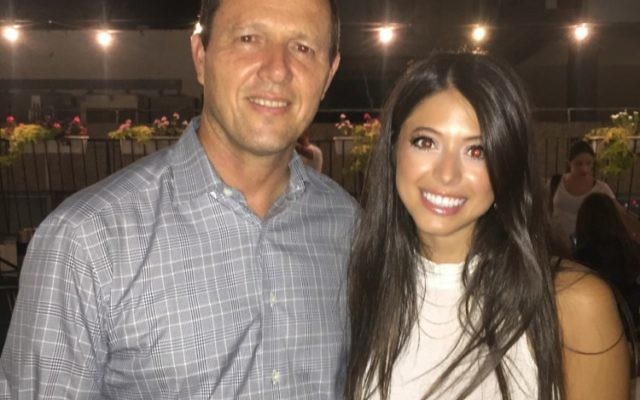My Summer Supporting Israeli Diplomacy
By Ariel Pinsky
As summer drew to a close, I completed my last remaining tasks as an intern in Israel and experienced a cacophony of feelings and emotions.
This summer I was afforded a rare opportunity to receive class credit from the University of Georgia to intern in Tel Aviv with an international organization called the Ambassadors’ Club of Israel.
Yitzhak Eldan, a former Israeli ambassador and chief of protocol for the Ministry of Foreign Affairs, founded the ACI five years ago with the goal of connecting ambassadors and consuls general in Israel to one another and to distinguished Israelis in each sector of society: the economy, academia, technology, entertainment, communication, medicine and the arts.
The nonprofit, independent organization is an extension of the second portion of the ministry’s general mission statement: “To implement Israel’s foreign policy and to promote economic, cultural, and scientific relations with other countries” (emphasis added).
Most of all, I felt incredibly gratified to work with such outstanding people on the ACI board in the country I consider my second home.
I expected my internship to be heavily research-based, with an emphasis on reporting on international affairs and Israeli politics, working with embassies to plan and organize diplomatic events, and discussing topics for diplomatic conferences. While those elements were present, I did not foresee just how hands-on my tasks would be — calling embassies and government ministers, representing the club at formal diplomatic functions and receptions, and engaging in multiple conversations, in Hebrew and in English, with a diverse array of business and government professionals (including Tel Aviv Mayor Ron Huldai and high-tech mogul Yossi Vardi).
I also was unprepared for the sheer amount of administrative work I was responsible for, from interpreting web analytics to updating hundreds of contact lists.
I adapted to working on Sundays, navigating the bus and train system, keeping up with the fast-paced Israeli lifestyle, and going along with the aggressive (though friendly) personalities.
I felt my skin grow thicker and stronger with the insults and the compliments, the derision and the praise I received daily — every detail and every mannerism faced scrutiny, and one step out of line was grounds for a harsh reprimand by club President Eldan.
The club’s CEO, Itsik Kamilian, often jokes that Eldan runs his organization like a high-level training facility for infantry officers. But when you consider what is on the line — Israel’s international reputation — it seems appropriate to do so.
Working in this incredibly tense environment was absolutely worth it because my accomplishments at the ACI will stay with me forever.
One particular exchange I am proud of is the discussion I had with Palestinian envoys invited to the Swiss National Day reception at the beginning of August. The group I spoke with runs an elementary and middle school called the Hope Flower School in Al Khader, Bethlehem. Together we came up with the idea to organize a program with students from Hope Flower and Eldan’s Young Ambassadors’ School that would allow the Palestinian and Israeli children to interact and visit each other’s school in an organized trip.
I learned over the summer that one of the biggest issues regarding the youths on both sides of the conflict is the figurative and literal walls around Palestinians and Israelis that block almost any physical interaction, contributing to the seeds of resentment that develop throughout their teen years as they become increasingly politicized.
Changing gears, I did not expect to work with a board so well connected and integrated into the upper ranks of Israeli society and politics. In this socialist-style economy, power and influence seem to trump wealth, and one is not necessarily the key to the other.
Perhaps it is easier to be well connected to major politicians and government officials in a smaller nation like Israel, but I was still impressed by the level of influence that the board members, who enjoy successful careers outside their consular positions, hold within different sectors of Israeli society.
I also learned that public events in Israel, perhaps unsurprisingly, are often permeated with an array of political attitudes. For example, gay rights activists interrupted a rooftop lecture on success I attended by Jerusalem Mayor Nir Barkat.
The protesters were upset that Barkat announced he would not attend the annual Jerusalem Gay Pride Parade despite the fatal stabbing of teenager Shira Banki a year earlier by a Hasidic Jew during the same parade. Barkat explained that he would lay a flower on Banki’s gravesite to show his support of her family, then stay home out of respect for Jerusalem’s ultra-Orthodox community.
At receptions hosted by the French and Swiss embassies, I met several prominent, outspoken BDS fighters. They believe the struggle against the boycott, divestment and sanctions movement is Israel’s most dangerous looming war, a war threatening to disrupt Israel’s true lifeline — the economy.
If the Israeli economy were to be crippled by BDS, not only would Israel’s citizens suffer, but also the state’s vulnerability to attacks from within and from neighboring states would exponentially increase.
Part of the mission of the Ambassadors’ Club is to promote increased business between Israelis and foreigners by connecting foreign diplomats to prominent Israelis who operate successful companies. Any effort to further weave the international community into Israel’s diverse economic fabric is a crucial step toward securing Israel’s survival as a Jewish state.
By that reasoning, I sincerely believe I contributed to Israel’s economic and thus political security on some level, however minuscule, through my work at the ACI this summer.






comments